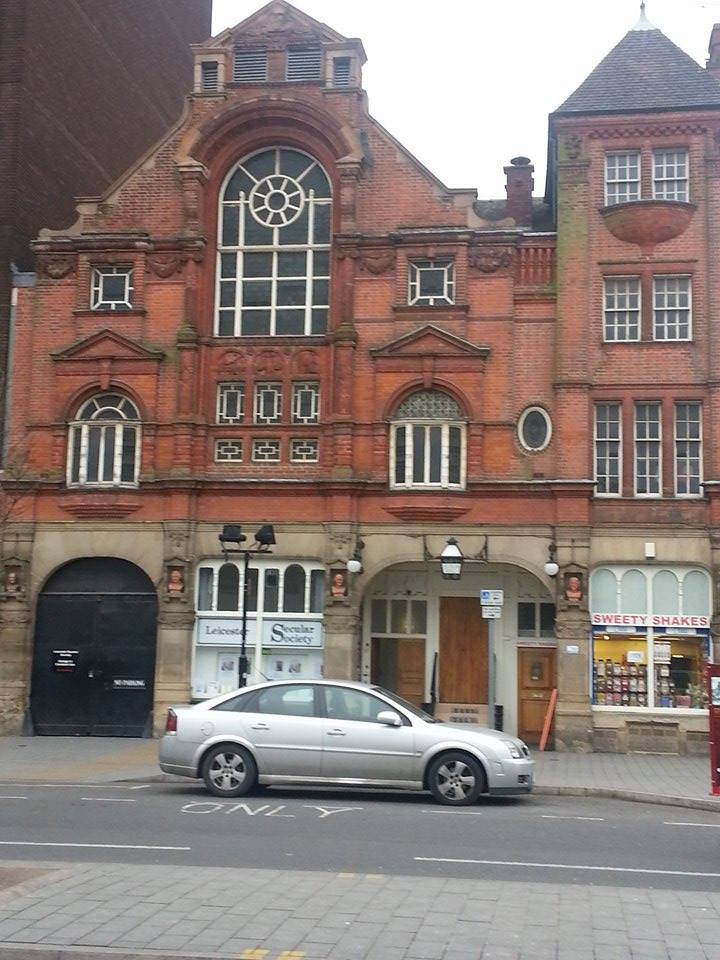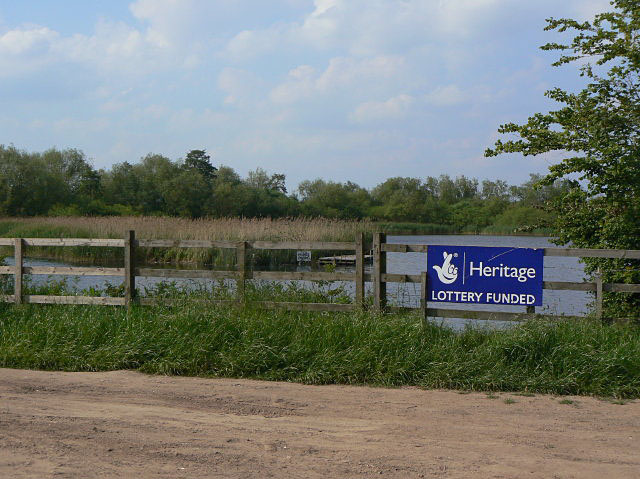|
Leicester Secular Hall
Leicester Secular Hall is a Grade II listed building in Leicester, England. It was built in 1881 for the city's Secular Society. The Leicester Secular Hall Co. Ltd for its construction. The lead shareholder was Josiah Gimson, an engineer and councillor. Ownership of the Hall subsequently passed to the Leicester Rationalist Trust. The building is located in the centre of Leicester at 75 Humberstone Gate. It was designed by W Larner Sugden of Leek, Staffordshire. The frontage contains five busts depicting, in chronological order, Socrates, Jesus, Voltaire, Thomas Paine, and Robert Owen. History The building of the hall was proposed in 1872 after George Holyoake, who coined the word "secularism", was refused the use of a public room for a lecture. George Bernard Shaw and William Morris are among the many radical thinkers who have spoken there. Current plans The ground floor was partially refurbished and accessible toilets installed in 2013 funded by the members of Leicester S ... [...More Info...] [...Related Items...] OR: [Wikipedia] [Google] [Baidu] |
George Jacob Holyoake
George Jacob Holyoake (13 April 1817 – 22 January 1906) was an English secularist, co-operator and newspaper editor. He coined the terms secularism in 1851 and "jingoism" in 1878. He edited a secularist paper, the ''Reasoner'', from 1846 to June 1861, and a co-operative one, ''The English Leader'', in 1864–1867. Early life George Jacob Holyoake was born in Birmingham, where his father worked as a whitesmith and his mother as a button maker. He attended a dame school and a Wesleyan Sunday School, began working half-days at the same foundry as his father at the age of eight, and learnt his trade. At 18 he began attending lectures at the Birmingham Mechanics' Institute, where he encountered the socialist writings of Robert Owen and later became an assistant lecturer. He married Eleanor Williams in 1839 and decided to become a full-time teacher, but was rejected for his socialist views. Unable to teach full-time, Holyoake took a job as an Owenite social missionary. His firs ... [...More Info...] [...Related Items...] OR: [Wikipedia] [Google] [Baidu] |
Buildings And Structures In Leicester
A building, or edifice, is an enclosed structure with a roof and walls standing more or less permanently in one place, such as a house or factory (although there's also portable buildings). Buildings come in a variety of sizes, shapes, and functions, and have been adapted throughout history for a wide number of factors, from building materials available, to weather conditions, land prices, ground conditions, specific uses, prestige, and aesthetic reasons. To better understand the term ''building'' compare the list of nonbuilding structures. Buildings serve several societal needs – primarily as shelter from weather, security, living space, privacy, to store belongings, and to comfortably live and work. A building as a shelter represents a physical division of the human habitat (a place of comfort and safety) and the ''outside'' (a place that at times may be harsh and harmful). Ever since the first cave paintings, buildings have also become objects or canvasses of much artistic ... [...More Info...] [...Related Items...] OR: [Wikipedia] [Google] [Baidu] |
Grade II Listed Buildings In Leicestershire
Grade most commonly refers to: * Grade (education), a measurement of a student's performance * Grade, the number of the year a student has reached in a given educational stage * Grade (slope), the steepness of a slope Grade or grading may also refer to: Music * Grade (music), a formally assessed level of profiency in a musical instrument * Grade (band), punk rock band * Grades (producer), British electronic dance music producer and DJ Science and technology Biology and medicine * Grading (tumors), a measure of the aggressiveness of a tumor in medicine * The Grading of Recommendations Assessment, Development and Evaluation (GRADE) approach * Evolutionary grade, a paraphyletic group of organisms Geology * Graded bedding, a description of the variation in grain size through a bed in a sedimentary rock * Metamorphic grade, an indicatation of the degree of metamorphism of rocks * Ore grade, a measure that describes the concentration of a valuable natural material in the surroun ... [...More Info...] [...Related Items...] OR: [Wikipedia] [Google] [Baidu] |
Secularism In England
Secularism is the principle of seeking to conduct human affairs based on secular, naturalistic considerations. Secularism is most commonly defined as the separation of religion from civil affairs and the state, and may be broadened to a similar position seeking to remove or to minimize the role of religion in any public sphere. The term "secularism" has a broad range of meanings, and in the most schematic, may encapsulate any stance that promotes the secular in any given context. It may connote anti-clericalism, atheism, naturalism, non-sectarianism, neutrality on topics of religion, or the complete removal of religious symbols from public institutions. As a philosophy, secularism seeks to interpret life based on principles derived solely from the material world, without recourse to religion. It shifts the focus from religion towards "temporal" and material concerns. There are distinct traditions of secularism in the West, like the French, Turkish and Anglo-American mode ... [...More Info...] [...Related Items...] OR: [Wikipedia] [Google] [Baidu] |
Tourist Attractions In Leicestershire
Tourism is travel for pleasure or business; also the theory and practice of touring (other), touring, the business of attracting, accommodating, and entertaining tourists, and the business of operating tour (other), tours. The World Tourism Organization defines tourism more generally, in terms which go "beyond the common perception of tourism as being limited to holiday activity only", as people "travelling to and staying in places outside their usual environment for not more than one consecutive year for leisure and not less than 24 hours, business and other purposes". Tourism can be Domestic tourism, domestic (within the traveller's own country) or International tourism, international, and international tourism has both incoming and outgoing implications on a country's balance of payments. Tourism numbers declined as a result of a strong economic slowdown (the late-2000s recession) between the second half of 2008 and the end of 2009, and in consequence of t ... [...More Info...] [...Related Items...] OR: [Wikipedia] [Google] [Baidu] |
Heritage Lottery Fund
The National Lottery Heritage Fund, formerly the Heritage Lottery Fund (HLF), distributes a share of National Lottery funding, supporting a wide range of heritage projects across the United Kingdom. History The fund's predecessor bodies were the National Land Fund, established in 1946, and the National Heritage Memorial Fund, established in 1980. The current body was established as the "Heritage Lottery Fund" in 1994. It was re-branded as the National Lottery Heritage Fund in January 2019. Activities The fund's income comes from the National Lottery which is managed by Camelot Group. Its objectives are "to conserve the UK's diverse heritage, to encourage people to be involved in heritage and to widen access and learning". As of 2019, it had awarded £7.9 billion to 43,000 projects. In 2006, the National Lottery Heritage Fund launched the Parks for People program with the aim to revitalize historic parks and cemeteries. From 2006 to 2021, the Fund had granted £254million ... [...More Info...] [...Related Items...] OR: [Wikipedia] [Google] [Baidu] |
Biffa
Biffa plc is a waste management company headquartered in High Wycombe, England. It provides collection, landfill, recycling and special waste services to local authorities and industrial and commercial clients in the United Kingdom. , it was the UK's second-largest waste-management company. It is listed on the London Stock Exchange and is a constituent of the FTSE 250 Index. History The company, which was originally engaged in the removal and sale of ashes and clinker from London power stations, was founded in Wembley by Richard Henry Biffa as Richard Biffa Limited, in 1912. In 1958 Richard Henry Biffa's grandson, Richard Charles Biffa, joined the business and, after becoming general manager in 1963, grew the business organically and by acquisition. The business was acquired by British Electric Traction in 1971 and by Severn Trent for £212 million in 1991. It acquired the American-owned UK Waste for £380 million in 2000. Severn Trent demerged the company to a consortium for ... [...More Info...] [...Related Items...] OR: [Wikipedia] [Google] [Baidu] |
William Morris
William Morris (24 March 1834 – 3 October 1896) was a British textile designer, poet, artist, novelist, architectural conservationist, printer, translator and socialist activist associated with the British Arts and Crafts Movement. He was a major contributor to the revival of traditional British textile arts and methods of production. His literary contributions helped to establish the modern fantasy genre, while he helped win acceptance of socialism in ''fin de siècle'' Great Britain. Morris was born in Walthamstow, Essex, to a wealthy middle-class family. He came under the strong influence of medievalism while studying Classics at Oxford University, there joining the Birmingham Set. After university, he married Jane Burden, and developed close friendships with Pre-Raphaelite artists Edward Burne-Jones and Dante Gabriel Rossetti and with Neo-Gothic architect Philip Webb. Webb and Morris designed Red House in Kent where Morris lived from 1859 to 1865, before moving t ... [...More Info...] [...Related Items...] OR: [Wikipedia] [Google] [Baidu] |
George Bernard Shaw
George Bernard Shaw (26 July 1856 – 2 November 1950), known at his insistence simply as Bernard Shaw, was an Irish playwright, critic, polemicist and political activist. His influence on Western theatre, culture and politics extended from the 1880s to his death and beyond. He wrote more than sixty plays, including major works such as ''Man and Superman'' (1902), ''Pygmalion'' (1913) and '' Saint Joan'' (1923). With a range incorporating both contemporary satire and historical allegory, Shaw became the leading dramatist of his generation, and in 1925 was awarded the Nobel Prize in Literature. Born in Dublin, Shaw moved to London in 1876, where he struggled to establish himself as a writer and novelist, and embarked on a rigorous process of self-education. By the mid-1880s he had become a respected theatre and music critic. Following a political awakening, he joined the gradualist Fabian Society and became its most prominent pamphleteer. Shaw had been writing plays for years ... [...More Info...] [...Related Items...] OR: [Wikipedia] [Google] [Baidu] |
Secularism
Secularism is the principle of seeking to conduct human affairs based on Secularity, secular, Naturalism (philosophy), naturalistic considerations. Secularism is most commonly defined as the Separation of church and state, separation of religion from civil affairs and the state, and may be broadened to a similar position seeking to remove or to minimize the role of religion in any public sphere. The term "secularism" has a broad range of meanings, and in the most schematic, may encapsulate any stance that promotes the secular in any given context. It may connote anti-clericalism, atheism, Naturalism (philosophy), naturalism, Nonsectarian, non-sectarianism, Neutrality (philosophy), neutrality on topics of religion, or the complete removal of religious symbols from public institutions. As a philosophy, secularism seeks to interpret life based on principles derived solely from the material world, without recourse to religion. It shifts the focus from religion towards "temporal" a ... [...More Info...] [...Related Items...] OR: [Wikipedia] [Google] [Baidu] |
Robert Owen
Robert Owen (; 14 May 1771 – 17 November 1858) was a Welsh textile manufacturer, philanthropist and social reformer, and a founder of utopian socialism and the cooperative movement. He strove to improve factory working conditions, promoted experimental socialistic communities, and sought a more collective approach to child rearing, including government control of education. He gained wealth in the early 1800s from a textile mill at New Lanark, Scotland. Having trained as a draper in Stamford, Lincolnshire he worked in London before relocating aged 18 to Manchester and textile manufacturing. In 1824, he moved to America and put most of his fortune in an experimental socialistic community at New Harmony, Indiana, as a preliminary for his Utopian society. It lasted about two years. Other Owenite communities also failed, and in 1828 Owen returned to London, where he continued to champion the working class, lead in developing cooperatives and the trade union movement, and support c ... [...More Info...] [...Related Items...] OR: [Wikipedia] [Google] [Baidu] |






.jpg)